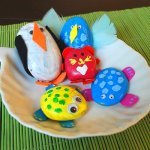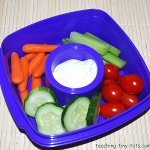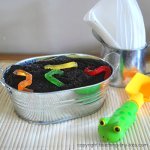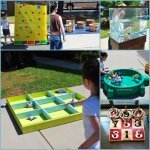- Home
- Science Activities
Toddler Science Activities
Toddlers and Kids Science Activities
Babies explore the world using their senses. They look, touch, smell, hear, and taste. Infants are curious and want to know everything about their environment. Your toddler's natural curiosity makes it easy to introduce science concepts during everyday activities. They naturally are interested in investigating everything in the world around them using all their senses. We can nurture their curiosity by giving them opportunities to interact with objects, living things and experiences that promote learning in a safe environment. Science starts with understanding concepts that develop as early as infancy. One of the first scientific processes is Observation which uses all the senses. Children are inquisitive and ask questions that arise from what they observe. We try as adults to give them accurate responses, but sometimes we may not know the answer. This gives us an opportunity to find out with your child through a book or online. We are all busy and it is easy to sometimes dismiss a question, but when you have a chance, by researching the answer, this is a great way to validate them and build their confidence by showing them their questions are important to you. Provided in the links below are activities that can be done with young children and older ones as well. I have done most of these in Grades K-6 and some with my own children when they were very young. Most of these activities use everyday household items. There are also some great resources out there but do some research. valuable resource is the National Science Teachers Association (NSTA) position statement on early childhood science education (endorsed by NAEYC). NSTA also has a site devoted to science resources for parents.Science Activities
- Dinosaur Activities
- Ivory Soap Experiment
- Growing Sugar Crystals: Rock Candy
- Making Bird Treats
- Marshmallow Rainbow
- Pumpkin Carving Activity with Free Printables
- Planting a Herb Garden
- Learn How a Plant Absorbs Water: The Celery Experiment
- Learning About Temperature
- Learning About Flowers and their Parts
- Printing with Flowers and their Parts
- Primary and Secondary Colors
- Fruit Loop Rainbow
- Slime Time! How to Make Slime
- Water and Sand Table
- Using Nature to Decorate a Birdhouse and Make Collages
Liquids and Solids
Investigating how liquids and solids respond to changes in temperature, for example water changing to ice, or melting chocolate can be done with cooking activities. You can also predict the effect of heat and cold on different materials.Earth Day Activities
For educators, Earth Day is an opportunity to demonstrate to students how love for and protection of the Earth is relevant across the world and to inspire young people to take action for the planet each and every day beyond just the classroom. We are sharing a few activities, to help bring this awareness to young children. These activities demonstrate concepts such as reusing materials to make new things. Bringing in reusable bags and clothing made out of recycled materials would also enhance their understanding of what recycling means and how it helps everyone.- Soda Bottle Terrarium
- Decorate a Recycle Bin
- Soda Bottle and Cork Flower Prints
- Recycle a Jug: Make a Watering Can
- Egg Carton Caterpillar
- Recycle Crayons to Make Rainbow Crayons
- Recycle a Baby Food Jar: Votive Candle Holders
- Make a Learning Shaker
- Styrofoam Tray Prints
- Recycle a Box: Make a House
Science Concepts
Observation
- Seeing
- Hearing
- Feeling
- Tasting
- Smelling
Communication
- Silent
- Oral
- Written
- Pictorial
Comparing
- Measuring
- Sensory Comparisons
- Weight Comparisons
- Capacity Comparisons
- Quantity comparison
Organizing
- Data Gathering
- Sequencing
- Grouping
- Classifying
Helpful Science Tools
- Bath Toys like Stacking Cups, floating toys
- Plastic Measuring Cups and Spoons
- Kid's Tape Measure
- Magnets for older kids, (magnets sealed for younger kids)
- Animal Picture Books See Our Favorites Here
- Puzzles
- Stacking and Building Toys
- Magnetic Letters and Animals
- Sand and Water Tables are great for the summer.
- Globe (they have inflatable, pillow types as well as your regular globe)
- Microscope-see age recommendations. There are different models for each age group.
- Magnifying Glasses-there are ones you can find for young children...be sure to check the age recommendations
- Telescope-see age recommendations
Interesting Facts
- Infants begin to learn about size by sensing that some things are smaller and some are bigger by sight and touch.
- Infants learn about direction as they learn to crawl and walk as they go over, into and under things.
- Children learn about weight as they lift different objects.
- Infants start to learn about shapes by the many toys we give them.
- Toddlers learn the concept of sets. They sort things, by color, size, or the same shape. You can encourage sorting to help them process these concepts. It also helps build vocabulary.
Benefits Gained from Introducing Science Concepts
- It becomes a natural part of a child's vocabulary.
- Vocabulary and cognitive process are developed as a child builds skills in Observation, Communication, Comparisons, Organizing and Applying.



